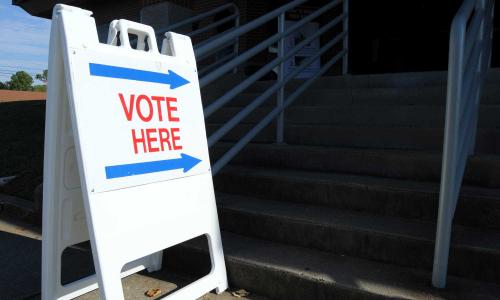As the 2024 election cycle ramps up, candidates at every level of government will be meeting with voters to make their case. We must push candidates to rise up and fight for science, for justice, and for progress.
Together we can ensure candidates lay out bold solutions to the most pressing issues of our time—climate change, nuclear weapons, and the relentless assault underway on science, truth, and justice. Here are some key questions that you can ask the candidates during the 2024 campaign season to ensure they advocate for science, and do so on the record.
Clean Energy
The United States is a world leader in deploying renewable energy but at the same time US oil and fossil gas production reached all-time record highs last year. The science is clear that within this decade and beyond we have to rapidly reduce fossil fuels otherwise we will fail to meet our climate goals. What is your plan to accelerate renewable energy deployment and curtail expansion of fossil fuels, while ensuring consumers and workers benefits from a clean energy transition?
Clean Transportation
The United States relies on the transportation sector for the movement of goods and people, but it is the largest contributor of global warming emissions in the country and a major source of harmful air pollution that contributes to serious public health issues. Black, Indigenous, people of color (BIPOC) communities have been disproportionately affected by tailpipe pollution from cars, trucks, and buses, and historic infrastructure choices, such as highway construction, have harmed many communities. What steps will you take to reduce emissions from transportation and ensure an equitable transportation system?
Climate Accountability
Fossil fuel companies are making record profits and continuing to expand production, even as the costs of climate change for people and businesses are rising rapidly. What is your plan to hold these companies accountable for the damages their products are causing and ensure their investments are aligned with climate goals?
Climate Change
2023 was the hottest year ever and climate change is contributing to a record number of extreme climate and weather-related disasters across the nation, imposing an immense toll on people and costing our economy billions of dollars every year. The US National Climate Assessment shows that every region in the country is already experiencing unprecedented changes and that impacts will worsen as global heat-trapping emissions rise. It also points out the opportunities we have to limit harms by accelerating the shift to clean energy and investing in climate resilience. What is your plan to help protect people, our economy, and critical ecosystems?
Food and Environment
The current US food system has been hijacked by a few powerful corporations whose practices endanger workers and our environment, and deny many people access to healthy food . The food and farm bill--critically important agriculture legislation passed by Congress every few years—offers an exciting opportunity to improve and transform our food system to better support farmers, workers, and eaters. As we move closer to this bill’s introduction, how will you support the passage of a food and farm bill that includes strong support for climate, nutrition, conservation, equity, and food and farmworker protections, and why do you believe these elements should be central priorities in the bill?
Nuclear Weapons
The Cold War nuclear arms race between the United States and the then Soviet Union increased the danger of nuclear war, caused extensive harm to marginalized communities, and cost US taxpayers $5.5 trillion dollars. Now there is pressure from some quarters to respond to Russian aggression in Ukraine and threatening behavior from China by building up US nuclear forces. This could trigger another dangerous competition for nuclear supremacy. Do you have a plan to avoid a new nuclear arms race and reform US nuclear weapons policies in a way that reduces their role in global security, the harm they cause, and the existential risk of nuclear war?”
Nuclear Justice
During the Manhattan Project and Cold War, the US government tested hundreds of nuclear weapons above ground, mined uranium—largely on Indigenous land—and created massive amounts of contamination and nuclear waste. Last year, the Senate passed legislation with a strong bipartisan vote to provide restitution to those exposed to radiation from these government actions. But, it was ultimately stripped out of final budget bills. If elected, would you seek to enact this restitution, and what do you think is the US governments' responsibility to these communities?
Science and Democracy
From safe food and drinkable water to breathable air, we rely on federal agencies to use the best available science to keep us safe and healthy. That’s why the relentless attacks on science and federal public protections by some major federal candidates and their political allies are so dangerous for our communities—especially those already facing public health and environmental threats. How will you support strong legislative solutions to safeguard scientific integrity and protect federal scientists who are accountable for ensuring science isn’t sidelined from the process of protecting public health, safety, and the environment?
As a 501c3 nonpartisan organization, UCS does not support or oppose any candidate for election.
